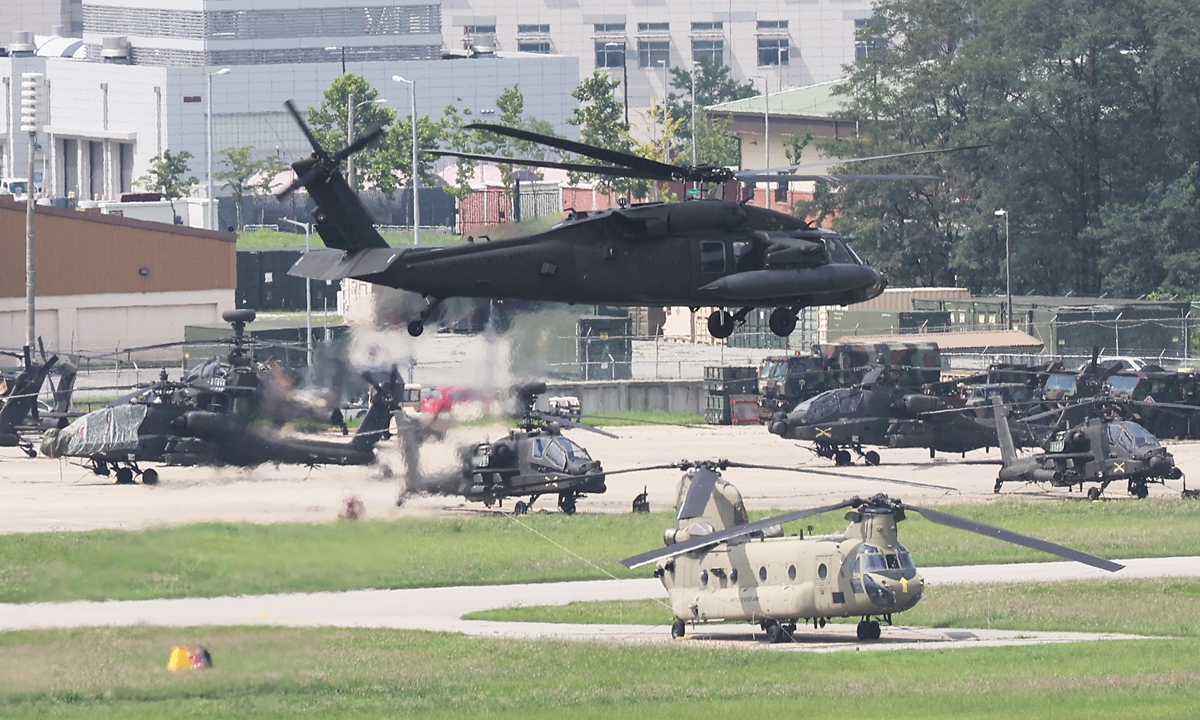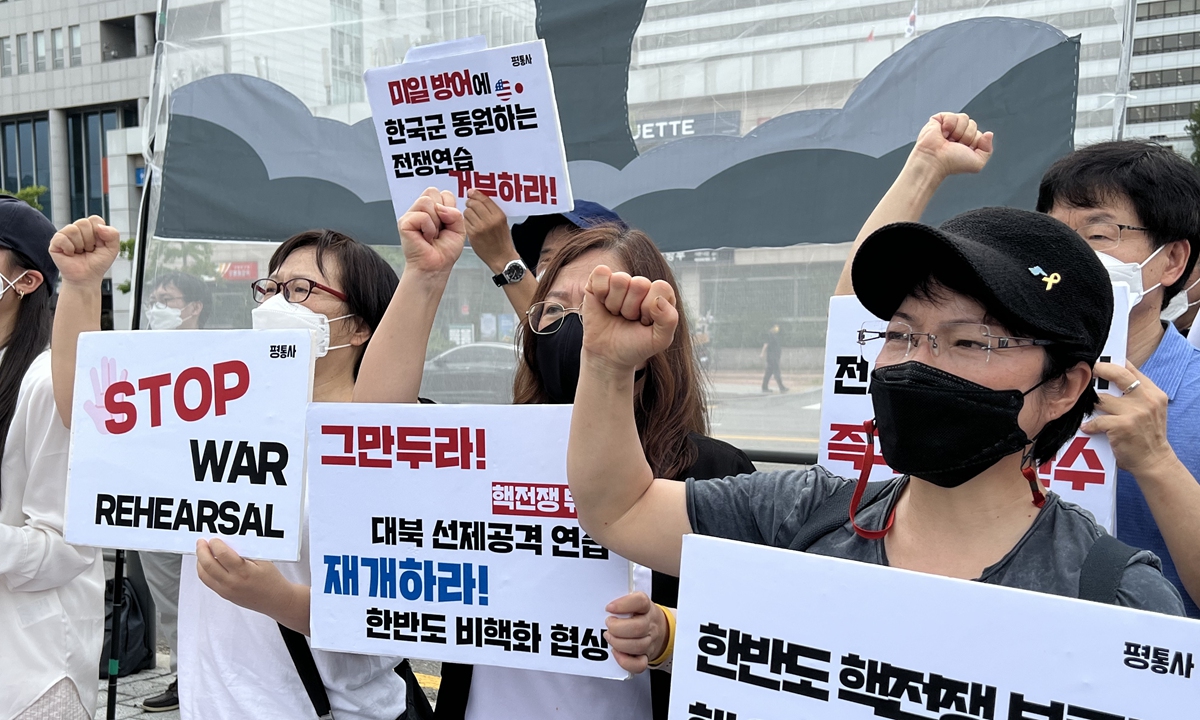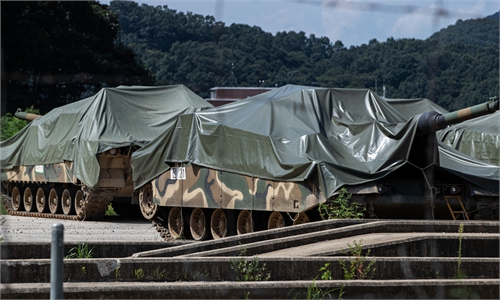US revives drill with S.Korea, ups efforts to disturb region; ‘flexing muscles shows its adventurism’

US-South Korea Ulchi Freedom Shield joint exercises start on August 22, 2022 in South Korea. Photo: VCG
South Korea and the US officially kicked off the biggest joint military drills in years on Monday, which include an array of contingency drills and involve thousands of troops, attempting to send a strong message of deterrent to North Korea. While some observers do not believe that the ongoing show of force specifically targets China amid rising tension in the Taiwan Straits, it indeed showed that the US - the biggest disruptor of the world's stability today - is ramping up efforts in escalating tension in the Korean Peninsula in order to strengthen its leadership among its allies and increasingly preparing to interfere militarily in affairs in the Northeast Asian and West Pacific regions.
The drills, named as the Ulchi Freedom Shield exercises, will continue through September 1 in South Korea and include field exercises involving aircraft, warships, tanks and potentially tens of thousands of troops, Yonhap News reported on Monday. Based on an all-out war concept, the exercise entails three key elements - the computer-simulation command post exercise, field training and Ulchi civil defense drills, and it is to proceed in two parts including the first segment involving drills on repelling attacks from North Korea and defending the greater Seoul area and the second part focusing on counterattack operations, the report said.
The revived US-South Korea military drills, which have been scaled down or halted during the Trump administration, serve as a new provocation to North Korea, some Chinese experts said, noting that China always insists on peaceful negotiations for solving the disputes in Northeast Asia and repeatedly warns that the region shouldn't be plunged into war, but the US - an extraterritorial country that repeatedly attempts to make deterrent by military means only - is intensifying the situation.
The joint military drills showed the original intention of the US is to highlight the inevitability of its role in the regional security by creating an intense atmosphere. Rather than focusing on the stability of the Korean Peninsula, the US is escalating the situation to keep its allies in the region more dependent on its military strength to maintain its leadership, a Beijing-based expert on international relations who preferred not to be named told the Global Times on Monday.
"Through such routine drills every year, the US attempted to demonstrate not only its military strength but also its preparation for the real military conflicts, reflecting its consistent adventurism and irresponsibility in its defense and security policy," he said.
Some US media outlets such as the Washington Post and the Wall Street Journal predicted that the largest field exercises in five years will probably trigger "an angry reaction" from North Korea, which will likely further provoke North Korea and prompt its moves toward nuclearization.

South Koreans protest against the Ulchi Freedom Shield exercises in Seoul on August 22, 2022. Photo: VCG
Provocative and aggressive
Yonhap also said that the drills will feature an array of contingency drills including concurrent field maneuvers that were not held over the past years under the preceding Moon Jae-in administration's drive for peace with Pyongyang. And various real-life scenarios, including the discovery of improvised explosive devices at nuclear power plants, a fire at a semiconductor factory, paralysis of a banking network, terrorism at airports and drone attacks, will be incorporated in the drills, Yonhap reported.
Wei Dongxu, a Beijing-based military expert, told the Global Times on Monday that the resumption of the Ulchi Freedom Shield joint military exercise shows that South Korea and the US want to demonstrate their capability to organize large military operations amid tensions in the Asia-Pacific region, and that Washington is ready to provide military support to Seoul.
Besides the involvement of tens of thousands of troops, the drills stage large numbers of aircraft warships and tanks practicing simulated joint attacks, frontline reinforcements of arms and fuel, and removals of weapons of mass destruction, according to media reports.
Judging from the size of the exercise, the training courses in the announced schedule and the forces the two sides plan to deploy, it showed that the US is increasingly preparing to interfere militarily in affairs in the Northeast Asian and West Pacific regions, Wei said.
The training courses planned in the drills go beyond the proclaimed defensive nature, and can be easily interpreted as provocative and aggressive, Wei said.
The premise of the drills, an all-out war, is just a presumption, and the possibility exists that South Korea and the US could launch a "counterattack" as practiced in the drills as they wish, without North Korea launching an actual initial attack in the first place, experts said.
As the South Korea-US exercise takes aim at North Korea, it could escalate tensions and damage security situation in the Asia-Pacific region as a whole, at a time when the US is also rallying up allies and partners to confront China amid tensions in the Taiwan Straits, according to experts.
'Counterproductive moves'
The joint drills came after the South Korean top leader proposed an aid-for-denuclearization plan for North Korea as South Korean President Yoon Suk-yeol vowed to give an "audacious" economic offer if Pyongyang shows firm commitment to denuclearization recently, which some Chinese experts said was a "carrot and stick" approach and that it's counterproductive.
"The Yoon government is carrying on both soft and harsh stances on North Korea but the joint drills are definitely counterproductive to the Korean Peninsula situation," Yang Xiyu, a senior research fellow at the China Institute of International Studies, told the Global Times on Monday.
The nuclear issue of North Korea is a fundamental issue concerning the guarantee for its national security, which means the issue can only be fixed by properly handling North Korea's national security concerns but the national security can't be traded with the economic benefits, Yang said.
If North Korea senses that its national security is threatened, it would continue on the path of nuclearization. Now the drills will make it feel bigger threat, which is counterproductive and could be seen as a negative interaction between the South and North, the expert noted.
Some Chinese experts also believe every military drill will lead to the Korean Peninsula situation escalating, and nobody knows if the drills will turn into an attack on North Korea or a provocation in a flash, triggering the bigger crisis on the Korean Peninsula.
"Such large-scale military presence in a country neighboring China and close to Russia will also deepen the distrust among major powers at a strategic level, posing negative impact on the global security," the Beijing-based expert said.
At the same time, some 17 countries including the US and Germany are holding the Australia-led Exercise Pitch Black starting Friday, with experts saying that the US is pulling more countries into an anti-China united frontline and intends to show the "unity" of the West to pressure China over the Taiwan question.
Wei, the military expert, said that the US is concentrating and integrating the military forces of its allies and partners around the globe, including Japan, South Korea and NATO members, to the West Pacific.
While the Korean Peninsula issue and the Taiwan question are two completely different matters, both are important to peace and stability in the Asia-Pacific region, and escalation in either one of them could lead to a spillover effect that all stakeholders in the region must consider, experts warned. Forces from outside of the region like the US are playing very bad roles here, they said.



